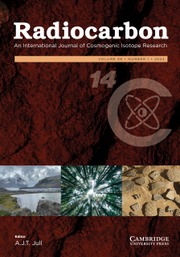Article contents
Advances in the Radiocarbon Analysis of Carbon dioxide at the NERC Radiocarbon Facility (East Kilbride) using Molecular sieve Cartridges
Published online by Cambridge University Press: 15 August 2019
Abstract
Radiocarbon (14C) analysis of carbon dioxide (CO2) provides unique information on the age, turnover and source of this important greenhouse gas, raising the prospect of novel scientific investigations into a range of natural and anthropogenic processes. To achieve these measurements, cartridges containing zeolite molecular sieves are a reliable and convenient method for collecting CO2 samples. At the NERC Radiocarbon Facility (East Kilbride) we have been refining our molecular sieve methods for over twenty years to achieve high-quality, reproducible and precise measurements. At the same time, we have been developing novel field sampling methods to expand the possibilities in collecting gas from the atmosphere, soil respiration and aquatic environments. Here, we present our latest improvements to cartridge design and procedures. We provide the results of tests used to verify the methods using known 14C content standards, demonstrating reliability for sample volumes of 3 mL CO2 (STP; 1.6 mg C) collected in cartridges that had been prepared at least three months earlier. We also report the results of quality assurance standards processed over the last two years, with results for 22 out of 23 international 14C standards being within measurement uncertainty of consensus values. We describe our latest automated procedures for the preparation of cartridges prior to use.
- Type
- Conference Paper
- Information
- Radiocarbon , Volume 61 , Issue 6: Radiocarbon 2018 Conference Proceedings Trondheim, Norway, June 17–22, 2018 Part 2 of 2 , December 2019 , pp. 1855 - 1865
- Copyright
- © 2019 by the Arizona Board of Regents on behalf of the University of Arizona
Footnotes
Selected Papers from the 23rd International Radiocarbon Conference, Trondheim, Norway, 17–22 June, 2018
References
REFERENCES
- 9
- Cited by


